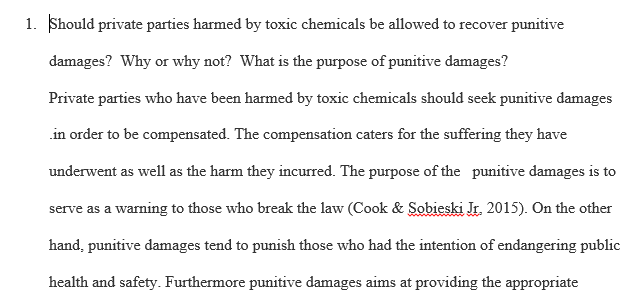Should private parties harmed by toxic chemicals be allowed to recover punitive damages
Should private parties harmed by toxic chemicals be allowed to recover punitive damages? Why or why not? What is the purpose of punitive damages?
Do you think that the U.S. Environmental Protection Agency does enough through the Toxic Substances Control Act (TSCA) to protect citizens from risks posed by new chemicals? Why or why not? Defend your answer using specific aspects of TSCA and specific examples.
Underground storage tanks (USTs) are still not meeting regulatory requirements; however, new requirements have recently been added to strengthen the UST regulatory program. What are some of these new requirements? Do you think that these new requirements will be adequate? Why? Are there additional actions that should be taken?
Some have criticized the Superfund legislation as a waste of taxpayer money. Do you think this is a valid criticism? Defend your position by citing specific examples.
there is a new housing development that has been built upon the same site called Black Creek Village. This is low income housing- another case of Environmental Injustice. The difference between this house development and Love Canal is that the new residents sign a paper saying that they live on a toxic site and cannot apply for damages if they are exposed.
It almost seems like turning the site into something new, is declaring it “fixed.” Should people be exposed to these fixed sites or should they remain uninhabited forever?
Answer preview to should private parties harmed by toxic chemicals be allowed to recover punitive damages
APA
728 words



